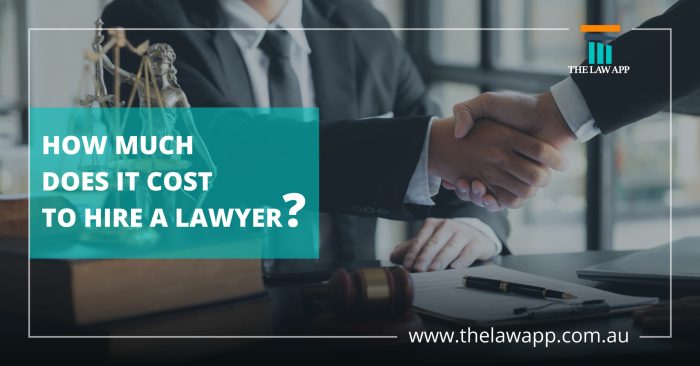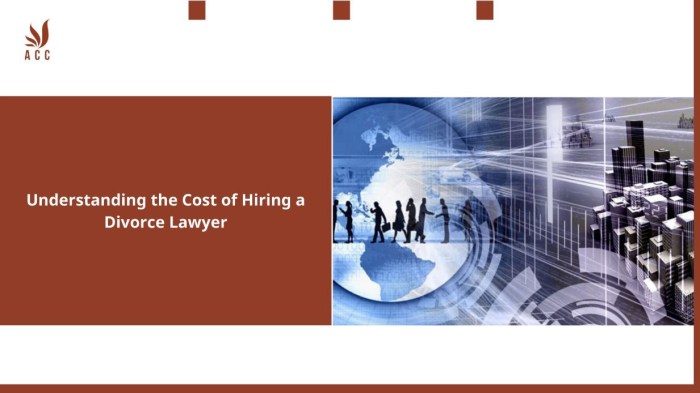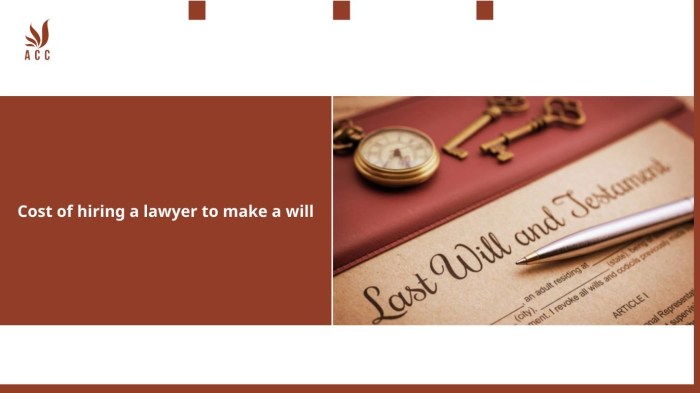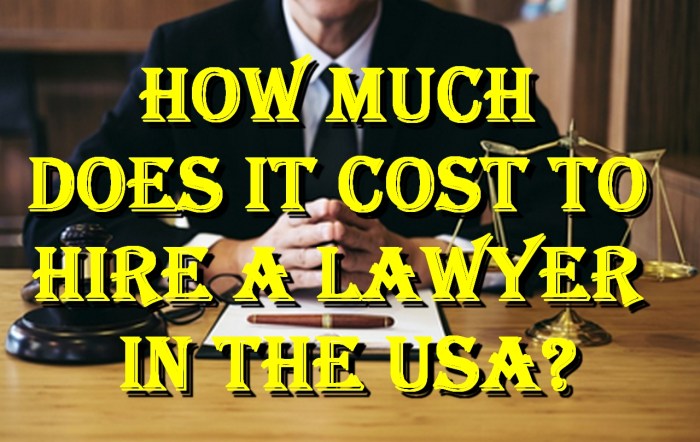What are the hidden costs of hiring a lawyer – Hiring a lawyer can be a daunting experience, especially when it comes to understanding the financial implications. Beyond the standard legal fees, there are a multitude of hidden costs that can add up quickly. This article will delve into the often-overlooked expenses associated with legal representation, empowering you to make informed decisions and avoid unexpected financial burdens.
From filing fees and court costs to expert witness fees and travel expenses, we will uncover the true cost of hiring a lawyer. Understanding these hidden costs will not only help you budget effectively but also ensure that you are fully prepared for the financial journey ahead.
Filing Fees
Filing fees are administrative costs associated with initiating a legal case or filing specific documents with the court. These fees vary depending on the type of case, the court in which it is filed, and the jurisdiction. Filing fees can be a significant expense, especially in complex or lengthy cases.
Types of Filing Fees
Common types of filing fees include:
- Initial filing fee: This is the fee required to initiate a lawsuit or other legal proceeding.
- Motion fees: These fees are charged for filing motions with the court, such as a motion to dismiss or a motion for summary judgment.
- Appearance fees: These fees are charged when an attorney enters an appearance on behalf of a client.
- Trial fees: These fees are charged for cases that go to trial.
- Transcript fees: These fees are charged for obtaining a transcript of court proceedings.
Impact of Filing Fees
Filing fees can have a significant impact on the overall cost of legal services. In some cases, filing fees can be thousands of dollars. This can be a deterrent for individuals or businesses who are considering pursuing legal action. In addition, filing fees can add to the financial burden of individuals who are already facing legal challenges.
Court Costs
Hiring a lawyer can involve various court costs that may significantly impact your overall expenses. These costs can vary based on the jurisdiction and the nature of your case.
Common court costs include:
Filing Fees
- Initial filing fees to initiate a lawsuit or legal proceeding.
- Additional fees for filing motions, amendments, or other documents.
Witness Fees
- Compensation for individuals subpoenaed to testify in court, including expert witnesses.
- Fees can vary depending on the witness’s expertise, experience, and location.
Expert Witness Fees
- Charges for professionals with specialized knowledge hired to provide testimony or analysis.
- Fees can be substantial, especially for highly qualified experts.
Discovery Costs: What Are The Hidden Costs Of Hiring A Lawyer

Discovery is the process of exchanging information between the parties in a lawsuit. It can be a time-consuming and expensive process, especially in complex cases. There are a number of costs associated with discovery, including:
Document Production
Document production is the process of exchanging documents that are relevant to the lawsuit. This can include emails, text messages, contracts, and other types of documents. The costs of document production can vary depending on the number of documents that need to be produced, the format of the documents, and the location of the documents.
Depositions
Depositions are out-of-court examinations of witnesses. They are typically conducted by attorneys for the parties involved in the lawsuit. The costs of depositions can vary depending on the length of the deposition, the number of witnesses who are deposed, and the location of the deposition.
Interrogatories
Interrogatories are written questions that are sent to the other party in a lawsuit. They are typically used to obtain information about the other party’s case. The costs of interrogatories can vary depending on the number of interrogatories that are sent, the complexity of the interrogatories, and the time it takes to prepare the answers.Discovery costs can vary significantly depending on the complexity of the case.
In simple cases, discovery costs may be relatively low. However, in complex cases, discovery costs can be very high. It is important to budget for discovery costs when planning for a lawsuit.
Trial Costs
Going to trial can be a costly endeavor, and it’s important to be aware of the potential expenses involved before making a decision about whether or not to proceed with a lawsuit.
The following are some of the most common costs associated with going to trial:
Jury Fees
Jury fees vary from state to state, but they can range from a few hundred dollars to several thousand dollars. In some cases, the losing party may be responsible for paying the jury fees.
Witness Fees
Witnesses are entitled to be compensated for their time and expenses, including travel and lodging. The amount of compensation will vary depending on the witness’s location and the length of time they are required to testify.
Expert Witness Fees
Expert witnesses are paid to provide testimony on specific issues that are relevant to the case. Expert witness fees can be very high, ranging from several thousand dollars to tens of thousands of dollars.
Court Reporter Fees
Court reporters are responsible for creating a verbatim transcript of the trial proceedings. Court reporter fees can vary depending on the length of the trial and the complexity of the case.
Deposition Costs
Depositions are out-of-court proceedings where witnesses are questioned under oath. Deposition costs can include the cost of the court reporter, the cost of the videographer (if a video deposition is being taken), and the cost of the witness’s time.
Trial Preparation Expenses
Trial preparation expenses can include the cost of preparing exhibits, hiring investigators, and conducting research. These expenses can vary depending on the complexity of the case.
The total cost of going to trial can vary significantly depending on the following factors:
- Length of the trial
- Complexity of the case
- Number of witnesses
- Need for expert testimony
It’s important to discuss the potential costs of going to trial with your lawyer before making a decision about whether or not to proceed. Your lawyer can help you weigh the costs and benefits of going to trial and make an informed decision.
There are also potential financial risks associated with going to trial. If you lose the case, you may be responsible for the other side’s legal fees. Even if you win the case, the trial could be long and expensive, and it could take a toll on you and your family.
Settlement Costs

When a case is settled, there are certain costs that may be incurred by both parties. These costs can vary depending on the complexity of the case and the willingness of the parties to negotiate.
Attorney Fees
Attorney fees are typically the most significant cost associated with settling a case. The amount of attorney fees will vary depending on the experience of the attorney, the complexity of the case, and the amount of time spent on the case.
Mediation Fees
Mediation is a process in which a neutral third party helps the parties to reach a settlement. Mediation fees are typically paid by both parties and can vary depending on the experience of the mediator and the length of the mediation.
Court Costs
Court costs are fees that are charged by the court for filing a lawsuit or motion. These costs can vary depending on the court and the type of case.
Expert Witness Fees
Hiring expert witnesses can significantly impact the overall cost of a legal case. These professionals provide specialized knowledge and opinions to support your arguments in court. Understanding the factors that influence their fees is crucial for budgeting purposes.
The expertise, experience, and location of an expert witness are key determinants of their fees. Experts with specialized knowledge in a particular field, such as medical or financial matters, typically charge higher fees than those with more general expertise. Similarly, experts with extensive experience in providing testimony in court command higher rates.
Factors Influencing Expert Witness Fees
- Expertise and specialization
- Experience and reputation
- Location and availability
- Complexity of the case
- Time required for preparation and testimony
Budgeting for expert witness fees is essential to avoid unexpected expenses. It’s important to factor in not only their hourly rates but also potential costs for travel, accommodation, and other expenses related to their involvement in the case.
Litigation Support Costs

Litigation support services are essential for managing and organizing the vast amounts of data involved in legal proceedings. These services can help law firms and their clients save time, money, and resources. The costs associated with litigation support can vary depending on the size and complexity of the case.
Document Management
Document management is a critical component of litigation support. It involves the organization, storage, and retrieval of documents that are relevant to a case. Litigation support professionals can help law firms manage their documents electronically, which can save time and money.
E-Discovery
E-discovery is the process of identifying, preserving, and producing electronically stored information (ESI) that is relevant to a case. Litigation support professionals can help law firms with e-discovery by using specialized software to search for and collect ESI.
Trial Preparation
Trial preparation is a complex process that requires careful planning and execution. Litigation support professionals can help law firms prepare for trial by creating demonstrative exhibits, organizing witness testimony, and managing trial logistics.
Travel and Accommodation Expenses

When hiring a lawyer, you may need to factor in potential travel and accommodation expenses. These costs can vary significantly depending on the location of the lawyer’s office and the length of the case.
If the lawyer’s office is located far from your home, you may need to travel to meet with them for consultations, hearings, or trial. This can involve expenses for transportation, such as flights, train tickets, or car rental, as well as accommodation, such as hotel stays or Airbnb rentals.
Tips for Minimizing Travel and Accommodation Expenses
- Consider hiring a lawyer who is located closer to your home.
- If possible, schedule multiple meetings or hearings on the same day to minimize travel.
- Look for discounts on transportation and accommodation, such as group rates or loyalty programs.
- Consider staying in budget-friendly accommodations, such as hostels or guesthouses.
Negotiating Travel and Accommodation Expenses with a Lawyer
Before hiring a lawyer, discuss travel and accommodation expenses with them and try to negotiate a reasonable arrangement. Consider the following tips:
- Be transparent about your budget and any limitations you have.
- Ask the lawyer to provide an estimate of potential travel and accommodation expenses.
- Consider asking the lawyer to include travel and accommodation expenses in their fee agreement.
- Be prepared to compromise and negotiate a solution that works for both parties.
Time Commitment

Hiring a lawyer involves a significant time commitment from the client. The amount of time required can vary depending on the complexity of the case, the lawyer’s availability, and the client’s involvement in the process.
Impact on Personal and Professional Life
The time commitment can have a substantial impact on the client’s personal and professional life. Clients may need to take time off work, rearrange schedules, and make sacrifices in other areas to accommodate meetings, court appearances, and other legal proceedings.
Average Time Commitment for Different Case Types
The following table Artikels the average time commitment for different types of legal cases:| Case Type | Average Time Commitment ||—|—|| Simple Contract Dispute | 20-40 hours || Complex Litigation | 100-200 hours or more || Criminal Trial | 50-150 hours or more || Family Law Matter | 50-100 hours |
Managing Client Expectations
“It’s crucial to manage client expectations regarding the time commitment involved in their case. Open communication and realistic timelines help avoid misunderstandings and ensure a successful attorney-client relationship.”
Sarah Jones, Esq.
Sample Email to Communicate Time Commitment
Dear [Client Name],I am writing to confirm the estimated time commitment for your case. Based on my initial review, I anticipate that the case will require approximately [number] hours of my time.This estimate may vary depending on factors such as the complexity of the case, the availability of necessary documents, and the level of your involvement in the process.I will keep you updated on my progress and inform you of any changes to the estimated time commitment.
Please do not hesitate to contact me if you have any questions or concerns.Sincerely,[Lawyer Name]
Contingency Fees
Contingency fees are a type of fee arrangement in which the attorney’s fees are contingent upon the successful outcome of the case. This means that the attorney will not receive any payment unless the client wins or settles their case.
Contingency fees are often used in personal injury, medical malpractice, and employment law cases, where the client may not have the financial resources to pay for an attorney upfront.
Factors Influencing the Percentage of Contingency Fees, What are the hidden costs of hiring a lawyer
The percentage of a contingency fee is typically negotiated between the attorney and the client. The following factors can influence the percentage of the fee:
- The complexity of the case
- The likelihood of success
- The attorney’s experience
Understanding the Terms of a Contingency Fee Agreement
It is important to understand the terms of a contingency fee agreement before signing it. The agreement should clearly state the following:
- The percentage of the recovery that the attorney will receive
- Any costs that the client may be responsible for
- The circumstances under which the attorney may withdraw from the case
Examples of Contingency Fee Agreements
Contingency fee agreements are often used in the following types of cases:
- Personal injury cases
- Medical malpractice cases
- Employment law cases
Ethical Considerations Related to Contingency Fees
There are a number of ethical considerations related to contingency fees. One concern is the potential for conflicts of interest. For example, an attorney may be tempted to settle a case for less than its full value if they are concerned about losing their contingency fee.
Another concern is that contingency fees can lead to attorneys taking on cases that they are not qualified to handle. It is important for clients to be aware of these ethical concerns before entering into a contingency fee agreement.
Hourly Fees
Hourly fees are a common billing structure for legal services, where the client is charged a set amount per hour for the time spent on their case. The hourly rate is typically determined by the lawyer’s experience, expertise, and the complexity of the case.Factors influencing the hourly rate include the lawyer’s reputation, the size and location of their firm, the type of law being practiced, and the demand for legal services in the area.
Hourly Rate Calculation
Hourly rates can vary widely depending on these factors. For example, a junior lawyer at a small firm in a rural area may charge $150 per hour, while a senior partner at a large firm in a major city may charge $500 per hour or more.
Retainer Fees
Retainer fees are a common way for lawyers to charge for their services. A retainer fee is a payment that is made to a lawyer in advance, in order to secure their services for a specific period of time or for a specific project.
There are a number of benefits to using a retainer fee agreement. For clients, it can provide peace of mind knowing that they have secured the services of a lawyer, and that they will not be faced with unexpected legal bills.
For lawyers, retainer fees can provide a steady stream of income, and can help to cover the costs of running a law practice.
Factors that Influence the Amount of a Retainer Fee
The amount of a retainer fee will vary depending on a number of factors, including:
- The lawyer’s experience and expertise
- The complexity of the case
- The expected length of the representation
- The client’s financial situation
Tips for Negotiating a Retainer Fee Agreement
When negotiating a retainer fee agreement, it is important to keep the following tips in mind:
- Get a written agreement. This will help to protect both the client and the lawyer, and will ensure that there are no misunderstandings about the terms of the agreement.
- Understand the terms of the agreement. Make sure that you understand what services are covered by the retainer fee, and what the payment schedule is.
- Negotiate a payment plan. If you are unable to pay the retainer fee in full upfront, you may be able to negotiate a payment plan with your lawyer.
- Consider the possibility of a refund. In some cases, you may be able to get a refund of your retainer fee if you are not satisfied with the services provided by your lawyer.
| Key Points of Retainer Fee Agreements | Description |
|---|---|
| Amount of the retainer fee | The amount of money that the client must pay to the lawyer in advance. |
| Services covered by the retainer fee | The specific legal services that the lawyer will provide to the client. |
| Payment schedule | The schedule for paying the retainer fee. |
| Refund policy | The policy for refunding the retainer fee if the client is not satisfied with the services provided by the lawyer. |
“Retainer fees are an important way to protect both clients and lawyers. They can provide peace of mind for clients, and can help to ensure that lawyers are fairly compensated for their services.”
– John Smith, Esq.
Resources for Clients
- American Bar Association: Representing Yourself in Court
- Nolo: How to Find a Lawyer
- Martindale-Hubbell: Find a Lawyer
Additional Costs
Hiring a lawyer can entail additional costs beyond the lawyer’s fees. These expenses can vary based on the case’s complexity, the lawyer’s expertise and reputation, and the location of the proceedings.
Court Reporting Fees
Court reporters transcribe proceedings and provide transcripts. Their fees vary based on the length and complexity of the proceedings.
Photocopying Fees
Lawyers may charge for photocopying documents related to the case. The costs can accumulate quickly, especially in complex cases.
Postage Fees
Lawyers may incur postage expenses for mailing documents and correspondence. These costs can be significant if the case involves numerous parties or requires extensive document exchange.
Travel Expenses
If the lawyer needs to travel for depositions, hearings, or trials, they may pass on the travel expenses to the client.
Expert Witness Fees
Lawyers may hire expert witnesses to provide testimony on specific matters. Expert witness fees can be substantial, especially for highly specialized professionals.
Investigation Costs
In certain cases, lawyers may conduct investigations to gather evidence or prepare for trial. Investigation costs can include hiring private investigators, obtaining records, or conducting research.
Budgeting for Additional Costs
It is crucial to budget for additional costs when hiring a lawyer. Lawyers should provide an estimate of potential expenses and discuss payment arrangements. Clients should also consider setting aside a contingency fund for unexpected expenses.
“It is essential to factor in additional costs when budgeting for legal services. These expenses can significantly impact the overall cost of representation and should be discussed upfront with your lawyer.”
– John Smith, Esq., Attorney at Law
Long-Term Costs

Hiring a lawyer can have significant long-term financial implications that extend beyond the initial legal fees. These costs can impact a client’s credit score, future employment prospects, and overall financial well-being.
The long-term costs of hiring a lawyer can vary depending on the outcome of the case and the client’s financial situation. For example, if a client loses a case, they may be responsible for paying the opposing party’s legal fees in addition to their own.
This can result in substantial debt that can take years to repay.
Impact on Credit Score
Hiring a lawyer can negatively impact a client’s credit score. When a lawyer is hired, they will typically run a credit check on the client to assess their financial situation. This credit check can result in a hard inquiry, which can lower the client’s credit score.
Future Employment Prospects
In some cases, hiring a lawyer can also impact a client’s future employment prospects. If a client has a history of legal problems, this information may be disclosed to potential employers during a background check. This can make it more difficult for the client to find a job, especially in fields that require a high level of trust or security.
Case Study
For example, consider a client who hires a lawyer to represent them in a personal injury case. The client wins the case and is awarded a large settlement. However, the client’s legal fees are so high that they are left with little money after paying off their debts.
This can have a devastating impact on the client’s financial well-being, making it difficult for them to afford basic necessities such as housing, food, and healthcare.
Dialogue Script
Lawyer:“It’s important to consider the potential long-term costs of hiring a lawyer. These costs can include damage to your credit score, impact on your future employment prospects, and financial hardship if you lose the case.”
Client:“I understand. I’ll need to carefully weigh the potential benefits and risks before making a decision.”
Closing Summary
Navigating the legal landscape can be a complex and costly endeavor. By being aware of the hidden costs associated with hiring a lawyer, you can make informed decisions and avoid financial surprises. Remember to ask detailed questions, negotiate fees, and explore alternative fee arrangements to minimize expenses.
Ultimately, the key to managing legal costs effectively lies in open communication, transparency, and a clear understanding of the financial implications.
Popular Questions
What are some common hidden costs of hiring a lawyer?
Hidden costs can include filing fees, court costs, discovery costs, expert witness fees, and travel expenses.
How can I minimize the hidden costs of hiring a lawyer?
Negotiate fees, explore alternative fee arrangements, and ask detailed questions about potential expenses.
What should I do if I am concerned about the financial burden of hiring a lawyer?
Discuss your concerns with the lawyer, explore payment plans, and consider seeking legal aid or pro bono services.